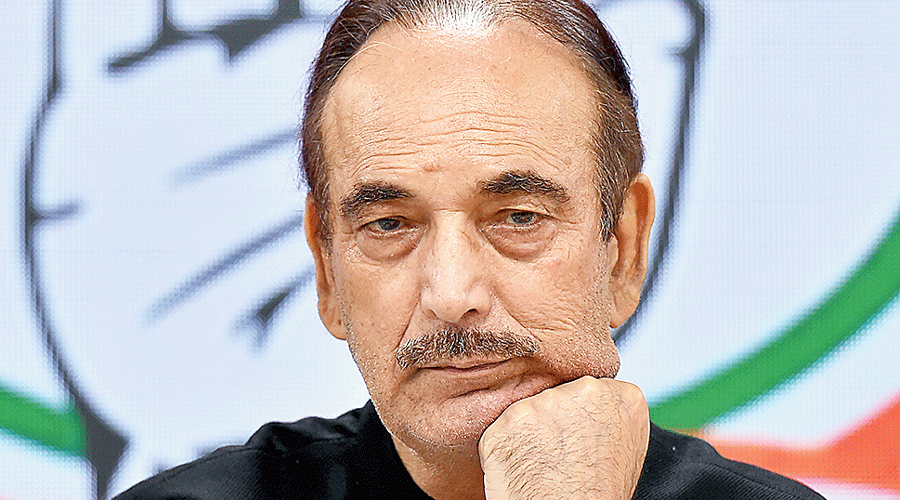When Congress workers and the leadership are gearing up to embark on the challenging Bharat Jodo Yatra to protect India’s composite culture and democratic traditions, one of their most pampered leaders on Friday vitiated the atmosphere through a betrayal that could shatter personal and political trust.
The 73-year-old Ghulam Nabi Azad, who was nominated to the Rajya Sabha five times, and got two Lok Sabha terms, several ministerial portfolios as well as top party posts, sent in a biting resignation letter that not only vilifies Rahul Gandhi but also predicts doom for the Congress, describing the situation in the party as “irretrievable”.
The timing of Azad’s attack, when the party is about to launch its most ambitious revival project in a do-or-die spirit, compelled some leaders to suspect that the motive was to offer political ammunition to “friend” Narendra Modi.
Congress communications chief Jairam Ramesh tweeted: “A man who has been treated with the greatest respect by the Congress leadership has betrayed it by his vicious personal attacks which reveal his true character. GNA’s DNA has been modified.”
GNA (Ghulam Nabi Azad) was described as Modi’s “friend” by Congress media head Pawan Khera, who said: “Workers understand this deceit. Somebody who betrays at this critical juncture is obviously being remote-controlled by Modi. We have seen their friendship in the Rajya Sabha.”
If Azad, a seasoned politician, argues that deficiencies in Rahul’s leadership is a bigger issue than the party’s perception of democracy and secularism being in peril, questions will be raised about his motive.
While suspicions were voiced when he formed a pressure group within the party in August 2020, known as the G-23, his farewell speech in the Rajya Sabha in February 2021 and subsequent activities appeared to confirm the intent to revolt.
In his farewell speech, Azad, who was the leader of the Opposition in the Rajya Sabha, made no mention of the Opposition’s vital concerns about democracy and constitutional rule and instead praised Modi for tolerance and magnanimity. Modi reciprocated, appearing to choke up while reminiscing about his long association with Azad.
The friendly overtures were stood out against the bitter hostilities that define government-Opposition engagements today.
Azad has firmly denied any possibility of joining the BJP even as the Congress suspects an indirect axis with the ruling party at least in Jammu and Kashmir, from where he hails and where he had served as chief minister.
In his resignation letter, Azad said that Sonia Gandhi heeded the advice of senior leaders but Rahul’s entry had demolished the consultative processes in the party.
“All senior, experienced leaders were sidelined and a new coterie of inexperienced sycophants started running the affairs of the party,” Azad wrote. Incidentally, Indira Gandhi, Rajiv Gandhi and Sonia were also accused of running the party with the help of coteries when leaders like Azad called the shots.
Azad identified Rahul’s “childish” act in 2013 of publicly tearing an ordinance, that had proposed a shield for convicted legislators against disqualification, as one of the primary reasons for the defeat of the Manmohan Singh government in 2014.
The UPA government was voted out after it had been discredited by a powerful corporate-backed propaganda in which the then comptroller and auditor general, Vinod Rai, is accused of playing a role with claims of a huge loss in the so-called 2G spectrum allocation scam.
Echoing the BJP’s line, Azad wrote: “The remote control model that demolished the institutional integrity of UPA government now gets applied to the Congress.”
He added: “While you (Sonia) are just a nominal figurehead, all the important decisions were being taken by Rahul Gandhi or rather worse his security guards and PAs.”
Azad’s grudging the culture of sycophancy in the Congress after thriving in it for five decades was a bit rich, observers said. If he resented Sonia’s alleged interference in the government between 2004 and 2014, many felt there is no point talking about it in 2022.
With respect to his complaint G-23 leaders were vilified and humiliated, Congress leaders believe that Azad and Anand Sharma rebelled only after the party decided against giving them any more Rajya Sabha nominations.
While Azad has doubtless provided ammunition to the media and the BJP to further discredit the Congress leadership, the political ramifications of his exit may be felt only in Kashmir. Despite being a Muslim leader who dominated the political scene for decades, he has little clout among minorities. The G-23 leaders were anyway missing when the Congress hit the streets against price rise.
Still, a veteran like Azad quitting the Congress is bound to strengthen the narrative of a sinking ship.











